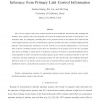Free Online Productivity Tools
i2Speak
i2Symbol
i2OCR
iTex2Img
iWeb2Print
iWeb2Shot
i2Type
iPdf2Split
iPdf2Merge
i2Bopomofo
i2Arabic
i2Style
i2Image
i2PDF
iLatex2Rtf
Sci2ools
111
click to vote
JSAC
2011
2011
Decentralized Cognitive Radio Control Based on Inference from Primary Link Control Information
This work on cognitive radio access ventures beyond the more traditional “listen-before-talk” paradigm that underlies many cognitive radio access proposals. We exploit the bi-directional interaction of most primary communication links. By intelligently controlling their access parameters based on the inference from observed link control signals of primary user (PU) communications, cognitive secondary users (SUs) can achieve higher spectrum efficiency while limiting their interference to the PU network. In one specific implementation, we let the SUs listen to the PU’s feedback channel to assess their own interference on the primary receiver (PU-Rx), and adjust radio power accordingly to satisfy the PU’s interference constraint. We propose a discounted distributed power control algorithm to achieve non-intrusive secondary spectrum access without a centralized controller or active PU cooperation, and study analytically its convergence property. We show that the link control fee...
Related Content
| Added | 14 May 2011 |
| Updated | 14 May 2011 |
| Type | Journal |
| Year | 2011 |
| Where | JSAC |
| Authors | Senhua Huang, Xin Liu, Zhi Ding |
Comments (0)

